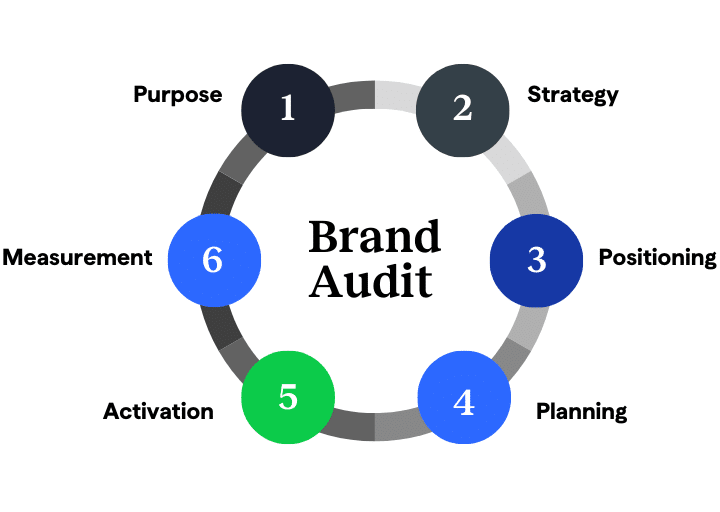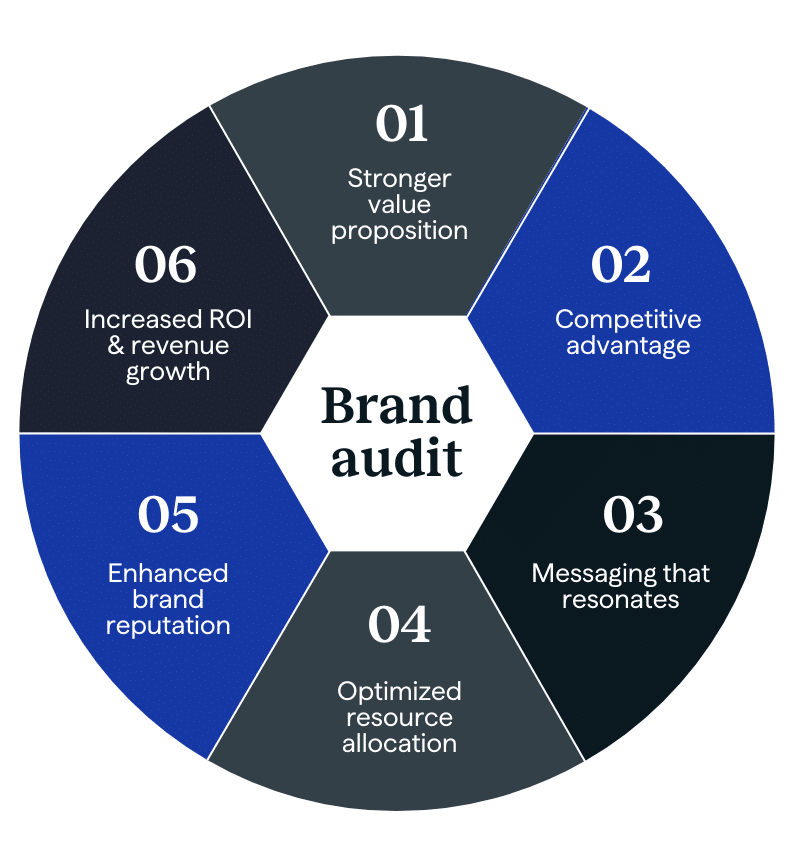What Is a Brand Audit? The Executive’s Guide to Higher Valuation
What is a brand audit and why is it essential for the C-suite? Find out how brand audits can help you mitigate risks, and drive higher company valuation.
POST UPDATED:
October 23, 2025

In our experience working with business clients—both large and small—we have found that almost all of them share a similar problem. There is a disconnect between leadership's vision for the organization and how the company communicates that vision to the public.
In other words, the company culture and internal branding have become disjointed. And a disjointed brand is expensive.
Here's what that looks like:
Vague competitive positioning forces the company to rely more on discounted prices. Inconsistent messaging extends sales cycles. The brand name has a weak presence in the market, so it's losing sales before prospects enter the pipeline. When it's time to raise capital or explore a merger and acquisition (M&A), acquirers often discount business valuation because they cannot quantify brand equity.
There are other symptoms, but the results are the same: a company struggling to break through and achieve the next level of growth.
However, you can utilize a key process to correct these problems or prevent them altogether.
What is a brand audit?
A brand audit is a comprehensive analysis designed to identify any growth issues and provide a plan to correct them.
An audit explores your company's market performance, competitive positioning, and economic value. It evaluates clarity, customer fit, pricing power, and channel strength.
The audit maps brand equity to revenue mix, gross margin, customer acquisition cost-to-lifetime value ratio (LTV), and valuation drivers. It includes a review of messaging, design, and product cues across every touchpoint compared to competitors, delivering a gap analysis with priority recommendations and return on investment (ROI) forecasts.
After a brand audit, you'll know exactly where your organization drives value and where it bleeds revenue. You'll receive a prioritized roadmap to strengthen positioning, refine messaging, and enhance perception across every touchpoint.
The result is shorter sales cycles, higher win rates, better pricing power, and measurable brand equity that enhances valuation.

Understanding what a successful brand audit does
An audit provides a comprehensive snapshot of your brand's current standing and how customers perceive it in relation to competitors. This insight helps you focus brand strategies on objectives that drive results.
A successful brand audit measures awareness, equity, and customer sentiment using both hard metrics and qualitative insights.
Quantitative inputs include aided and unaided brand awareness, share of search, reach, conversion, Net Promoter Scores (NPS), and price premium.
Qualitative inputs, such as interviews, open-text reviews, and social listening, uncover what people think, feel, and expect from your brand.
This approach ties directly to Customer-Based Brand Equity (CBBE), which develops from three core elements:
Brand salience: The speed and ease with which your brand comes to mind.
Brand image refers to the associations and meaning customers attach to your brand.
Brand feeling: The emotions your brand generates in the market.
When you conduct a brand audit, you examine all market dynamics in play.
A basic brand assessment covers the company's visual identity (i.e., the logo, color palette, typography, layout), consistency across marketing materials, messaging clarity, and brand voice. It may also include other details, such as the website's visibility, social media presence, and other aspects of the marketing plan.
The final report maps the customer experience from pre-purchase to post-purchase, uncovering friction points that impact brand performance.
Companies should repeat the process every 12 to 24 months to maintain brand relevance.
Audits can also be performed for both businesses and personal brands.
Corporate brand audit: Focuses on multi-market reach, complex portfolios, pricing power, investor trust, M&A alignment, and employer brand values.
Personal brand audit: Examines niche authority, content voice, thought leadership, platform mix, network quality, speaking opportunities, and lead pipeline.

The importance of a brand audit for executive leadership
A brand audit helps ensure that the business strategy remains relevant to the market landscape and the needs of customers. It reveals what is working to keep the brand strong and any weaknesses that block growth. Businesses that fail to conduct annual audits often make strategic decisions based on gut feelings and skewed opinions.
An audit is also essential for managing risk and creating value.
Periodic audits help keep marketing strategies aligned with shifting demand. Markets move fast. New competitors arrive on the scene every day. New channels emerge. A comprehensive brand audit verifies whether your value proposition, pricing, and messaging effectively convey your brand's message and support your marketing campaigns. If not, changes are in order.
There are other keys to a successful brand strategy that companies must address. An audit measures factors such as brand recall, preference, and perceived value across different segments. The audit identifies disconnects between the brand's promise and the proof provided at every touchpoint, thereby enhancing opportunities for customer loyalty and profit margin.
Data is essential and plays a pivotal role in the success of an audit. For example, customer perception drives revenue. Therefore, companies should assess customer sentiment (how consumers perceive your brand) when they conduct an audit and include any other component tied to success.
The brand audit process reveals hidden vulnerabilities you miss day-to-day, such as:
- Misaligned value propositions across regions, marketing materials, or sales presentations.
- In marketing and support channels, there are inconsistent visuals, tone, and naming.
- Off-brand service scripts or slow response times weaken brand perception.
- Pricing or promotional patterns train buyers to wait for deals.
- Clunky onboarding or returns processes drain trust and LTV.
An effective brand audit highlights the brand's strengths to focus on, such as high customer satisfaction scores among enterprise buyers, and weaknesses to address, such as unclear brand positioning in self-serve segments.
| Gap in Brand Element | Customer Impact | Sales Effect |
|---|---|---|
| Vague positioning | Low trust and slower decisions | Longer cycles, lower win rate. |
| Inconsistent visuals | Less recall and brand confusion. | Lower conversion |
| Message-claim mismatch | Doubt after trial | Higher churn |
| Weak proof, no case studies. | Risk concerns | Discount pressure |
From audit to action: Enhancing your brand
The final brand audit report is a diagnostic tool that delivers an actionable roadmap and converts findings into brand strategies you can implement. These strategies are tied to objectives, including increasing demand, enhancing pricing power, and improving lifetime customer value (LTCV).
The audit results will include clear, prioritized improvements across key areas:
Clarity: Sharpen your value proposition, proof points, and brand voice so every team tells the same story across all marketing materials and customer touchpoints.
Fit: Adjust offer names, price tiers, and packaging so that buyers can easily identify the right choice.
Signals: Refresh core visuals if brand awareness and distinctiveness are lagging, improving recognition and decision-making speed.
Reach: Fund-focused social media marketing or targeted campaigns if awareness runs low in key segments.
Committing to routine audits with transparent metrics enables you to make more informed investment decisions that drive sustainable growth.
From insight to execution: More about the brand audit process
The first step in total business transformation is to understand your current brand and its challenges. The audit provides all the facts your team needs to make improvements.
If you want to learn more about the brand audit process, including details about each step, read our detailed guide:
Ready to grow your brand?
Connect with a strategist to uncover your biggest opportunities and map out a clear path forward.

POST AUTHOR
FAQs: What is a brand audit?
Have other questions? Click here to get in touch with us.
Related Content

Expert Insights and Processes for Brand Analysis
Discover how comprehensive brand analysis drives business success. Learn key strategies, tools, and expert tips to refine your brand and outperform competitors.


